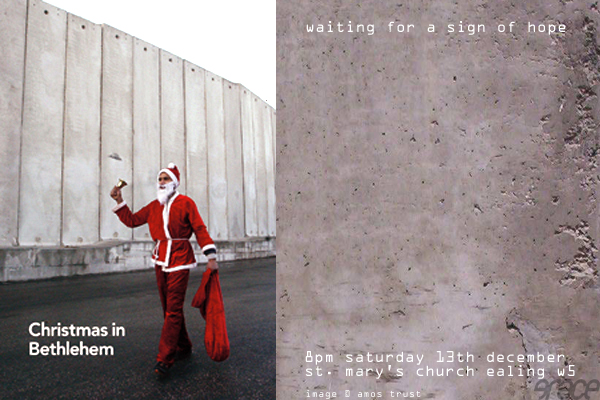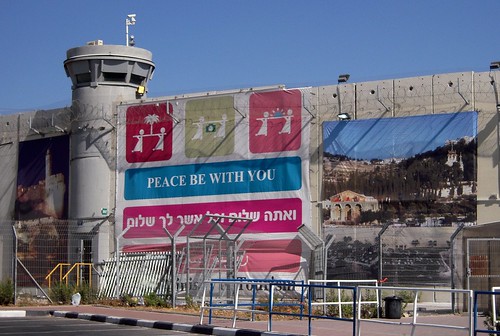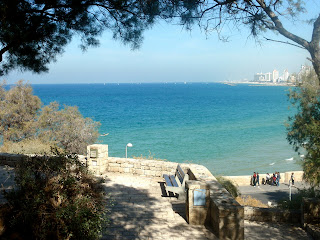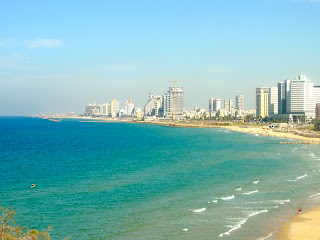I know, I know, I haven't posted in about two weeks. I promise I have a legitimate excuse.
I was dying.
Ok, slight exaggeration. More like I
thought I was dying. I guess there's a bit of a difference.
So let's set the scene, shall we?
I had just gotten back from a wonderful weekend in Tel Aviv. Monday was a happy, plain, normal work day. Then Tuesday was Palestinian Independence Day, and even though the name is incredibly deceiving, all of the schools and offices were closed in the West Bank. I had plans to go into Jerusalem with a friend, but she called that morning to say that she wasn't feeling well and would have to cancel. I, of course, was a little bummed, but it turned out to be the best thing that could have happened.
I decided to stay in and rest; take a lazy day doing some laundry, catching up on cleaning, and working on grad school applications. Around noonish, I started to not feel so great. Like,
really not so great. I was pretty sure that someone was taking a butcher knife to my abdomen; I had this awful, stabbing pain. Then I started to run a high fever.
"Oh my gosh," I thought to myself, "Sharp stabbing pain. High fever. I have appendicitis! They're going to need to remove my appendix. This is bad. I am
so not a third-world-emergency-surgery kind of girl."
So what did I decide to do? Wait it out (translation: ignore it). I kept reading that if you have appendicitis, you should go to the hospital right away, because your appendix usually bursts about 24 hours after the symptoms start, and then the pain magnifies by a thousand percent. "Perfect!" I think, "if the pain gets way more intense after 24 hours, then I'll know that my appendix burst and that I actually do have appendicitis. But if it doesn't get more intense, then either I have the Chuck Norris of appendices, or it's something other than appendicitis. I'll just wait, and this way, I can avoid going to the hospital for nothing."
I should put a note in here that I
really hate hospitals. They're always cold, and they always smell funny. I hate being poked and prodded. I hate being asked stupid questions about "on a scale of one to ten." I hate that 99% of the time, the doctor says "go home, drink lots of fluids, and get some rest." I can make that diagnosis on my own, thankyouverymuch. I get flashbacks to when I was 10 years old and in the hospital for a week and a half with Pancreatitis. It's always just miserable.
This process of waiting worked really well up until about 3am. I woke up, got sick, and then tried to walk to my kitchen for some water. Well, on the way, I got light headed and dizzy, and broke out in a cold sweat. I was pretty sure that this was the end. I would pass out while trying to get water, fall onto my tile floor, and either crack my head open or freeze to death (there's a little electric heater in my bedroom, which keeps the temperature up in the 60s, but in my kitchen in the middle of the night, it's probably more around 45 degrees, but that's a whole different story). I made it back to my room, collapsed on my bed, and prayed for a swift death.
And then as soon as I could move again, I caved and called one of the other MCC service workers to take me to the hospital. At 3:15 in the morning. I definitely have the world's most fantastic coworkers!
So we head to a little private hospital in Beit Jala, the village where I live. I am the only patient in the entire emergency room, and am immediately wheeled back (oh yeah, I got a wheelchair... so embarrassing) into the only room. A doctor and nurse, both men, come into the room and start speaking to me in Arabic. My coworker (who is Canadian, but fairly fluent in Arabic) explains that I don't speak much Arabic, but am having sharp pain and we are worried that it is appendicitis. The doctor and nurse just kind of stare at me and then ask me where I'm from, then they talk to each other in Arabic, and then the nurse starts giggling, and they leave. I was totally confused, and a little frustrated. I was in pain! I just wanted them to fix me and let me leave, but at this point, no one has touched me, done a single test, or asked me a single medical question.
My coworker, also a female, eavesdrops and explains to me that the nurse is giggling because he is embarrassed that his English is poor, and because I am a single Western woman, they are hesitant to touch me. They don't often see Westerners, especially not women (I assume that this is because if Westerners get sick, they usually go to hospitals in Israel, not in the West Bank). The culture here dictates that it is highly inappropriate (and very disrespectful) for men to touch women, and even though my doctor was a trained medical professional, it was obviously still difficult for him to overcome this deeply ingrained cultural rule.
Before long, they come back in, take some blood to run some tests, and give me an IV and some medication. My nurse put in the most painless IV that I've ever had, and I've had a few. I didn't feel anything, not even a sticking sensation! I was thrilled by his obvious IV inserting/blood drawing skills. After about five minutes, I realize that they had just given me medicine, but they didn't have any of my medical records, and they had never asked me if I have any allergies... which I do! So we called in the nurse to try to figure out what kind of medicine they gave me, but he didn't know, so he went to ask the doctor. They couldn't figure out how to translate it, but they'd never heard of the drugs I'm allergic to, and assured me they gave me something different.
We got the tests back, and the doctor said that it was not appendicitis (hurray!), but that it also wasn't viral, which meant it probably won't just go away on it's own (not hurray). So he told me to come back in for an ultrasound and some more blood tests in the morning, handed me a prescription for a drug, and gave me permission to leave.
Being me, I never went back in for the tests, but I did get the prescription filled, googled it, and found out that it is used to treat "acute abdominal bacterial infections." Gross. I took the meds. They started to make me feel better. After 6 days in bed, my fever finally broke and I was able to go back to work!
The bright side of this whole experience was that without any sort of medical insurance, my hospital stay, blood tests, IV, and medication all amounted to 100NIS, which is around $28. That just blew my mind. Also, I was in and out of the hospital in under 2 hours, which I think is an all time record for me!
Usually, people only have wonderful things to say about the hospitals here in the Middle East. Despite the fact that I was a little frustrated by the cultural differences, I'm so grateful that I am in a place where emergency care is available to those who need it - there are so many places in the world where it's not. And the fact that I can go to a pharmacy and get medication? Such an incredible blessing.
So this is my excuse for not posting in the last two weeks. I hope it's sufficient. With the Christmas season in Bethlehem fast approaching, I'm sure that I'll have many more exciting stories to share leading up to December 25th.
Stay safe, and stay healthy!

















































